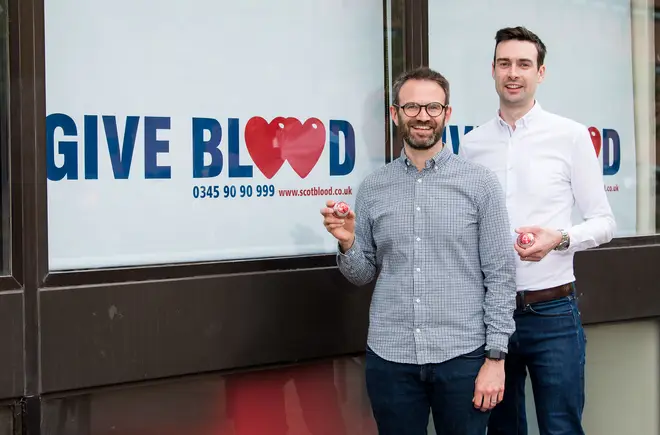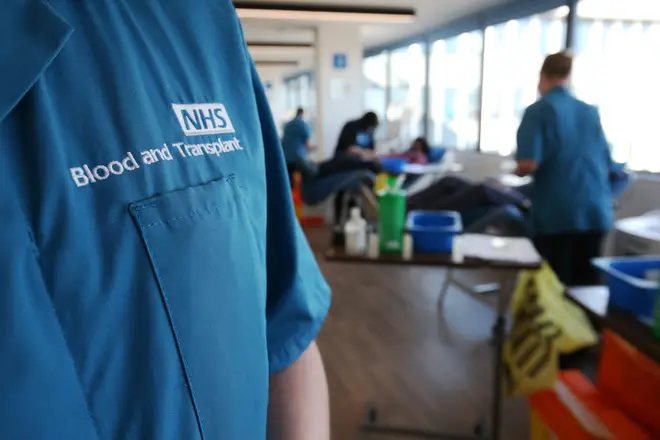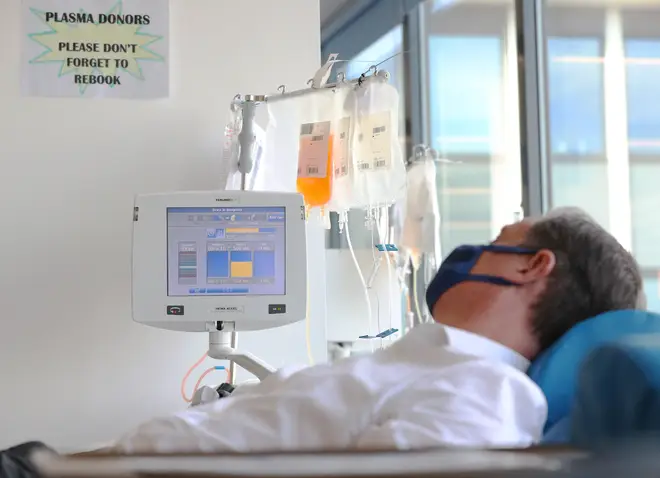
Ali Miraj 12pm - 3pm
14 June 2021, 07:47

More gay and bisexual men in Britain will be allowed to donate blood, platelets and plasma after "historic" new rules came into force on Monday.
Male donors will no longer be asked if they are a man who has had sex with another man, NHS Blood and Transplant said.
Instead, everyone giving blood regardless of gender will be asked if they have had sex and, if so, about recent sexual behaviours, it added.
Read more: German scientists "solve" Covid vaccine blood clot side effect
Read more: Grenfell survivors being 'denied swift justice', resident says
Anyone who has had the same sexual partner for the last three months will be eligible, meaning more gay and bisexual men will be able to donate blood, platelets and plasma.
Previously men who had sex with men had to wait at least three months after their last sexual activity before giving blood.

G7 must support disadvantaged nations in manufacturing, not donations
Some men were angered after they were also excluded from plasma trials to help treat Covid-19 despite being in a decades long monogamous relationship.
The new rules come into effect on World Blood Donor Day and will affect donors in England, Scotland and Wales.
In Northern Ireland the rules were also expected to change on Monday, but the implementation has been delayed as some systems are not yet in place, the Northern Ireland Blood Transfusion Service said.
Read more: PM defends G7 pledge to give 1bn vaccines to the world’s poorest countries
Read more: Frontline worker 'really proud' to be recognised in Queen's birthday honours
Ella Poppitt, chief nurse for blood donation at NHS Blood and Transplant, said the change is a result of "switching around how we assess the risk of exposure to a sexual infection, so it is more tailored to the individual".
"Patient safety is at the heart of everything we do," she explained. "We screen all donations for evidence of significant infections, which goes hand-in-hand with donor selection to maintain the safety of blood sent to hospitals.
"All donors will now be asked about sexual behaviours which might have increased their risk of infection, particularly recently acquired infections. This means some donors might not be eligible on the day but may be in the future."

Donor eligibility will now be based on individual circumstances surrounding health, travel and sexual behaviours shown to be at a higher risk of sexual infection, NHS Blood and Transplant said.
Under the changes people can donate if they have had the same sexual partner for the last three months, or if they have a new sexual partner with whom they have not had anal sex and there is no known recent exposure to a sexually transmitted infection (STI) or recent use of pre-exposure prophylaxis (PrEP) or post-exposure prophylaxis (PEP).
Anyone who has had anal sex with a new partner or with multiple partners in the last three months will be not be able to give blood but may be eligible in the future, it said.

The changes have been welcomed by charities including the National Aids Trust, Stonewall and Terrence Higgins Trust.
Robbie de Santos, director of communications and external affairs for Stonewall, said: "We welcome today's historic change, which will help ensure more gay and bi men can donate blood and represents an important step towards a donation selection policy entirely based on an individualised assessment of risk.
"We want to see a blood donation system that allows the greatest number of people to donate safely and we will continue to work with government to build on this progress and ensure that more people, including LGBT+ people, can donate blood safely in the future."
Read more: Euro 2020: Fan in 'serious condition' after falling from stands in England game

Long Covid: "The blood in me feels like it's hot"
But the Terrence Higgins Trust said the government had kept a "discriminatory restriction" in England which will affect black communities' ability to give blood.
The restriction bans individuals from donating who have had a sexual partner in the last three months "who has, or you think may have been, sexually active in parts of the world where HIV/Aids is very common" and references "most countries in Africa", the charity added.
Chief Executive Ian Green said the "excitement" of Monday's rule change was "significantly dampened by another discriminatory question being retained by government in the blood donation process in England, which presents a significant barrier to black donors in particular giving blood."
"This is despite it being removed in both Scotland and Wales, and the blood service actively encouraging black communities to donate plasma and blood due to shortages," he added.